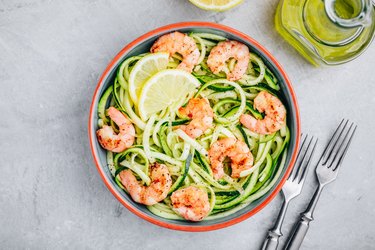
At 19 years old, wheelchair-bound Jordan Rubin was near death, diagnosed with a severe case of Crohn's disease. His story about how he healed himself by eating only foods eaten in biblical times is the basis for the Maker's Diet, a 40-day experience that Ruben says will change your life.
The Maker's Diet Basics
Video of the Day
According to the diet's official website, there are three main tenets of the Maker's Diet:
Video of the Day
- Eat what God created for food
- Don't alter God's design
- Don't let any food or drink become your idol
This means eating foods that are all-natural, unprocessed, unrefined, organic and not treated with hormones. The basics are pretty simple.
But it does get a little more complex than that, because the 40-day diet is split into three phases, each of which has different goals and food restrictions.
Phase One: Days 1 - 14
This is the most restrictive phase of the diet that temporarily decreases consumption of disaccharide-rich carbohydrates including:
- grains
- pasta
- bread
- sugar
- potatoes
- corn
- beans
- legumes
Rubin points out that the biblical diet contained plenty of grain and carbohydrate-rich foods, but that they were of higher quality, less processed and easier to digest. They were also eaten in much lesser quantities than people eat them today. The typical biblical diet was nearer to today's low-carbohydrate diet. This early phase will help wean you off a high-carbohydrate diet, so you can enjoy high-quality carbs in moderation in later phases of the diet.
There are plenty of other foods you can eat during this period:
- Meat, preferably grass-fed and organic: beef, lamb, venison, goat, liver and heart, buffalo, veal, elk
- Fish with fins and scales, preferably freshwater/ocean-caught: salmon, tuna, scrod, haddock, pompano, trout, orange roughy, snapper, herring, whitefish, canned tuna and salmon in spring water, halibut, cod, grouper, mahi mahi, wahoo, tilapia sea bass, mackerel and sole
- Poultry, preferably pastured and organic: chicken, duck, liver and heart, Cornish game hen, turkey
- Chicken and duck eggs, whole with yolk, preferably high omega-3/DHA
- Dairy: Plain goat's milk, kefir made from goat's milk, soft and hard goat milk cheeses, sheep's milk hard cheeses
- Fats and oils, preferably organic: butter, ghee, avocado, extra-virgin coconut and olive oils, flaxseed oil, hemp seed oil, goat's milk butter, raw cow's milk, expeller-pressed sesame oil, coconut milk/cream, goat's milk butter, organic cow's milk butter
- All vegetables except corn and white or sweet potatoes
- Lentils, preferably soaked or fermented
- Nuts and seeds, organic raw or soaked: almonds and almond butter, hempseed, sunflower seeds and butter, hemp seed butter, pumpkin seeds and butter, flaxseed, almond butter, tahini
- Fruits, preferably organic fresh or frozen: blueberries, blackberries, cherries, strawberries, lemons, raspberries, grapefruit, limes
- Beverages: purified water, natural non-carbonated sparkling water, herbal teas, raw vegetable juice, fermented beverages, organic coffee
- Condiments, free from fillers, additives, added sugar, preservatives and wheat: herbs and spices, pickled ginger, wasabi, organic flavor extracts, tomato sauce, omega-3 mayonnaise, tamari, apple cider vinegar, salsa, guacamole, Celtic sea salt, raw salad dressings and marinades
- Raw honey
Read more: 10 Myths About Grains — Totally Busted
Phase Two: Days 15 to 28
Phase two begins to introduce new foods. You may continue to eat all the foods from phase one, and add:
- Fresh fish roe/caviar
- Sliced turkey and sliced roast beef lunch meats that are free range and preservative free, preferably organic and nitrite/nitrate free
- Dairy: kefir made from non-homogenized cow's milk, raw cow's milk hard cheese, cow's milk cottage and ricotta cheeses, cow's milk whole-milk plain yogurt, plain kefir and plain sour cream
- Expeller-pressed peanut oil
- Sweet potatoes, corn and yams
- Beans: white, kidney, navy, black and tempeh
- Nuts (raw, organic, soaked is best): walnuts, hazelnuts, pecans, macadamia nuts, Brazil nuts
- Fruit: Apples, grapes, peaches, pears, kiwi, pomegranate, guava, apricots, melon, oranges, plums, pineapple, passionfruit
- Condiments: ketchup without sugar, all-natural salad dressings and marinades
- Coconut water
- Unheated raw honey and stevia
Phase Three: Days 29 to 40
Phase three introduces many more foods, so that very few foods are restricted. Primarily, the only foods restricted are processed, low-quality foods. You may now eat:
- Beans and legumes: pinto beans, split peas, lima beans, black-eyed peas, red beans, garbanzo beans, broad beans, edamame
- Dry-roasted versions of all the nuts and seeds and nut and seed butters from phases one and two, as well as organic dry-roasted peanuts and peanut butter and raw or dry-roasted cashews and cashew butter
- Fruits: Banana, papaya, dried without added sugar or sulfites, mango, fruit canned in its own juice
- Beverages: Raw, unpasteurized fruit and vegetable juices, organic wine and beer
- Whole grains: sprouted breads, fermented whole-grain sourdough bread, kamut, spelt, pasta made from kamut and spelt, oats, barley, brown rice, amaranth, millet, sprouted cereal
- Sweeteners: 100 percent pure maple syrup, organic cane juice
Phase three is meant to be a maintenance phase lasting beyond day 40. The Maker's Diet isn't considered temporary; once you reach the final phase, the goal is to maintain a diet of natural, unprocessed, whole foods for life, which Harvard T.H. School of Public Health confirms is just as important than how many calories you eat.
Read more: Healthy Carbs You Should Be Eating More Of